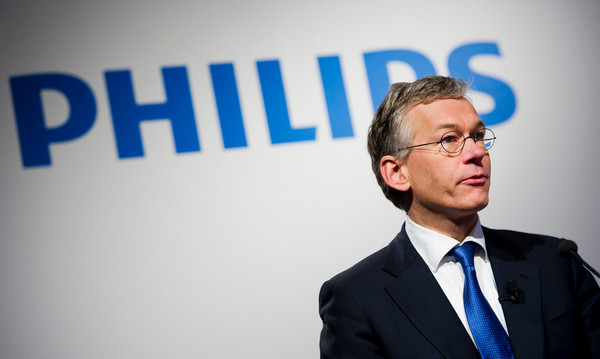Philips transfer of its LED component and automotive lighting business Lumileds to Go Scale Capital was abruptly halted by the Committee on Foreign Investment in the United States (CFIUS) over national security concerns, reported The Economic Times on Monday.
In an interview with Bloomberg, Philips CEO Frans van Houten noted the company would continue to work with Go Scale Capital to quell any concerns raised by CFIUS, and aims to seal the deal.
 |
|
Philips CEO Frans van Houten. (Photo courtesy of Philips) |
The news has been met with mixed responses from the LED community, Taiwanese LED manufacturers have welcomed the news with much cheer, but the blocked acquisition could cost Philips and other Chinese LED manufacturers significantly. LEDinside presents a preliminary analyses of potential outcomes.
If U.S. regulators forbid Philips to sell Lumileds to Chinese investor Go Scale Capital, Philips will have to find another buyer. Potential candidates that would be interested in acquiring Lumileds include Korean, American or other Chinese manufacturers.
Philips Lighting business IPO would be directly hit by this outcome. For starters, the separation of the lighting business would be complicated if Lumileds remained a Philips subsidiary. The lighting business would be enlarged to include LED luminaires, lighting systems, LED lighting components, and automotive lighting businesses. Philips former plan was to first sell Lumileds, which would simplify Philips Lighting IPO by slimming it down to only lighting systems and luminaires. From Philips perspective this spin-off model would generate a higher gross margin, and the business units could be sold at a higher value.
But if U.S. regulators block the business transaction, this will have significant impact on Philips future business plans.
Another major impact would be on GSR Ventures and the investment arm it directs Go Scale Capital. The company planned to procure Lumileds to develop LED related businesses, and to integrate the international company with the local Chinese LED manufacturing supply chain. The aim was to synergize Chinese LED manufacturers production capacity and product portfolio with Lumileds. Go Scale Capital also took out a US $1.93 billion loan from several Chinese banks, including The Bank of China to finance the acquisition. Go Scale Capital’s business plans will be impacted to a certain extent if the merger is canceled.
The outcome would also create very different circumstances for European, American and Taiwanese LED chip manufacturers. For instance if Lumileds sale to Go Scale Capital is blocked, it would present very different market competition outcomes for Osram or Cree. The latter U.S. LED manufacturer might have greater opportunities in acquiring more OEMs from Lumileds or technologically cooperate.
In the Taiwanese LED manufacturing camp, LED chip manufacturer Epistar is viewed as the biggest benefactor of the cancelled deal. Epistar is Lumileds major OEM, industry insiders raised concerns that Chinese LED companies financed by Go Scale Capital would snatch some of Lumileds OEM orders had the acquisition deal been sealed, according to a report by Chinese-language media Liberty Times.
If U.S. regulators agree Philips sell of Lumileds to Go Scale Capital, the deal would have went on according to Philips plan and revolutionized the global lighting industry accordingly.
GSR Ventures, one of the major investors of Go Scale Capital, would have been able to vertically and horizontally integrate the Chinese and Asian LED market. It would have also boosted Chinese LED and lighting industry outlook.
Taiwanese LED chip manufacturers would under even more intense market competition from Chinese makers, while Cree would have to compete against a new Lumileds endowed with abundant Chinese manufacturing resources. Osram would also have to replan its LED lighting system business spin-off and direction.
Will U.S. government intervention in LED business transactions to Chinese buyers become an industry norm? Or will Lumileds be an exclusive case? Could the CFIUS decision be applicable to Bridgelux sale to Chinese government backed Chinese Electric Component (CEC) LED subsidiary Kaistar as well? All these remains questionable and require further market observations.
However, a precedent acquisition case shows a glimmer of hope for Philips and Go Scale Capital. Korean LED manufacturer Seoul Semiconductor’s UV LED affiliate Seoul Viosys spent three years in talks with the U.S. Department of Defense before it successfully acquired U.S. UV LED company SETi.
The final outcome will still largely rely on Philips and CFIUS negotiations. For further details stay tuned to LEDinside’s upcoming analyses and reports from Hong Kong International Lighting Fair (Autumn Edition) where we will be conducting an exclusive interview with Lumileds executives.
(Author: Ivan Lin, Head of Content Department, TrendForcehttp:// Editor and Translator: Judy Lin, Chief Editor, LEDinside)
Related Articles for further reading:





 CN
TW
EN
CN
TW
EN




